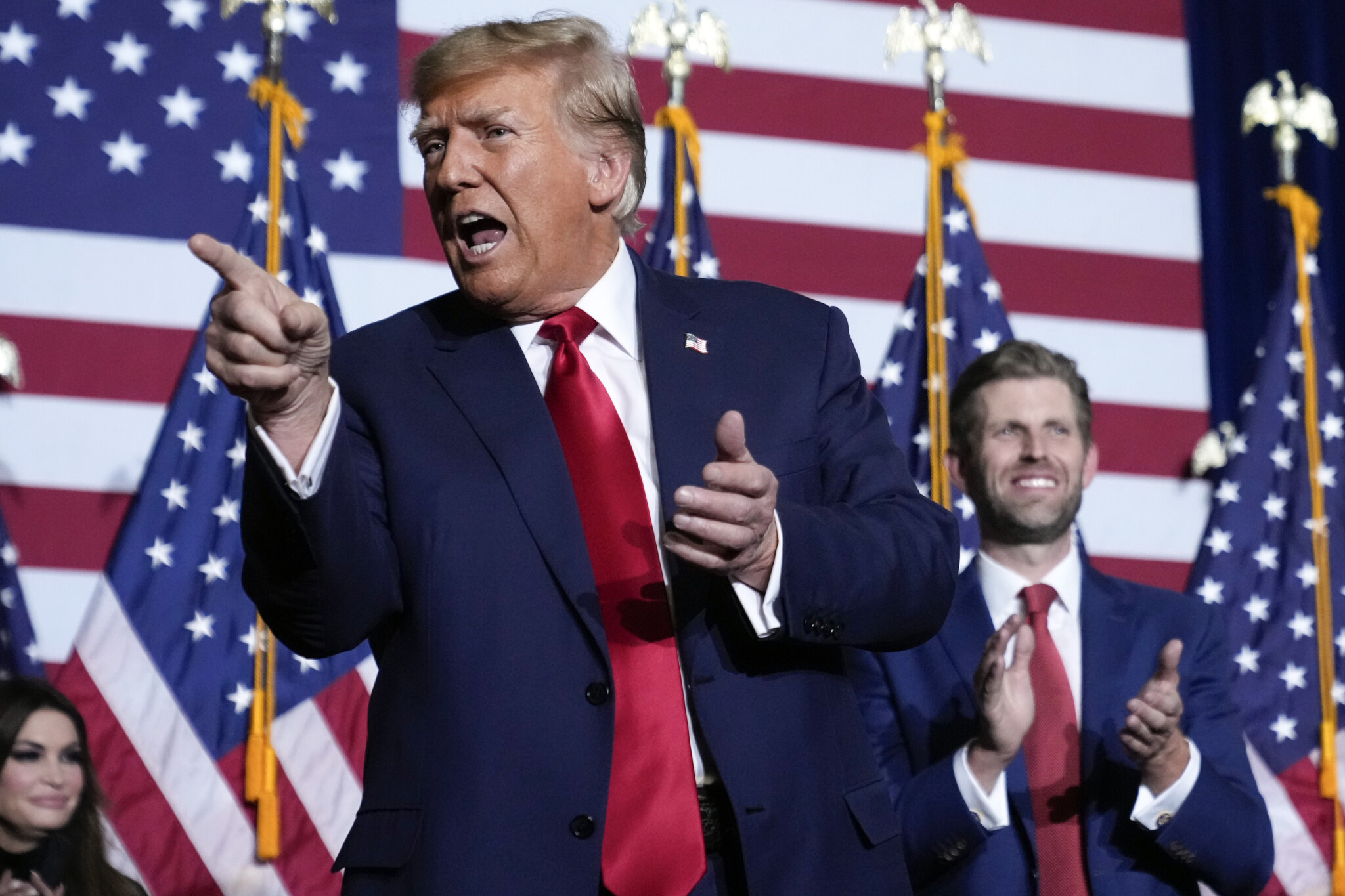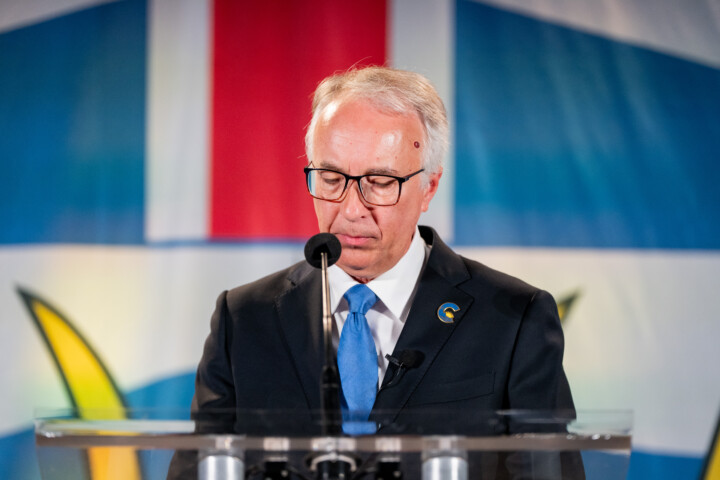‘It is fact free, it is chaos’: Jennifer Robson on whether Trump can be persuaded to back down on tariffs
In the latest episode of Trump’s Trade War, publisher of The Hub Rudyard Griffiths speaks with Jennifer Robson, associate professor at Carleton University, about how Canada should respond to Trump’s tariff threats.
To read Jennifer’s full analysis click here.
The following is an automated transcript. If you are quoting from or referencing this episode, please refer to the audio to verify.
RUDYARD GRIFFITHS: Rudyard Griffiths here, the publisher of the hub, welcome to this, our continuing video series, Trump’s trade war. Each day here on The Hub, we’re going to bring you the best analysis and insights from our writers appearing on the hub.ca. Our goal is to share with you some new analysis and insights on this fast, emerging issue. We don’t know what’s going to happen over the next 30 days, but we got a bit of time here to try to get prepared. Really fortunate to have on the program today, Jennifer Robson, she’s a associate professor of political management at Carleton University, and was out early in the hub this week with what I thought was some, some really spot on analysis. It certainly got me thinking. Jennifer, welcome to the program.
JENNIFER ROBSON: Thank you. Thank you so much for having me here.
RUDYARD GRIFFITHS: I want to pull up on our quote board here for the audience something you said that, yeah, got me thinking, and have you unpack the argument behind it? To quote you, there is nothing to gain trying to persuade Trump. What did you mean? What’s the thinking behind that statement?
JENNIFER ROBSON: Right? Okay, so I want to just caveat everything I’m going to say here by saying I am. I am not, normally a scholar of international relations. I am not in Trump’s head. Obviously, this is my hot take as a as a diligent observer and somebody who has studied public policy for a long time. What I meant by that is that when we think about how Canada traditionally does diplomacy, how what we’ve heard reported in terms a lot of the efforts we are talking about fact based presentations of information, right? That if a concern is raised about the nature of the trade deficit, there is a persuasive argument back with regards to but let’s take a look at the actual volume of the trade deficit, and bear in mind that actually a huge portion of that is only constrained to goods. A large part of that is also explained by the heavy consumption of Canada’s oil exports United States. But these are all sort of this is an argument based in a belief that by the presentation of other forms of information and facts, that you might be able to change the desired audiences, perceptions and therefore their behavior. And I think what we have seen over and over again, and that was elsewhere in that piece that you guys were kind enough to publish, is that Trump is operating in many respects, in kind of a fact free environment at the moment, that in terms of his justifications for why his view around the tariffs were necessary. It was a bit of a movable feast. And so I think when you’re confronted with it could be strategic behavior, but it is not strategic behavior that is necessarily fact based then persuasive arguments that are really grounded in trying to re establish some kind of shared reality, not likely to be very successful.
RUDYARD GRIFFITHS: So this is a fascinating quandary, because you know what, Jennifer, you’ve just hit on something I’ve been thinking about even since last night in the President’s bizarre statements about, you know, taking over Gaza, ejecting the Palestinians, reset. I mean, it just seems so, as you say, kind of Fact Free, wild, outlandish, I would even say, maybe foolish. How are policy makers then to respond to that? Because we are responding, and it seems like we’re caught in this trap where we have to respond because he is the president United States. He has these immense executive powers. He could do something to us, vis a vis terrorists or something else which could be very, very harmful. But at the same time, as you say, it’s all Fact Free. It all seems so discombobulated and and chaotic.
JENNIFER ROBSON: It really is chaotic. And now you add on to that, the layer of what appears to be happening within the federal government of the United States itself, in terms of massive, basically single handed, probably illegal attempts to lay off staff and just shutting down entire agencies. It is fact free. It is chaos. And then when we think about sort of relying on institutions of the United States government to be able to can, you know, continue those bilateral agreements, I mean, I think we’re in, we’re in a really, really difficult spot right now, I have been struck by the tone that, for example, Claudia Sheinbaum, has taken in Mexico, right? Which is not to sort of get into the the nitty gritty of is it, is it X number of kilos of fentanyl, or is it this many? You know, it’s just to to assert the view of Mexico, to stick to that and recognizing. This is not, this is not symmetrical bargaining, right? Like we, we are, we are not the same size as the United States. This is a high risk situation for us. But I have been a bit concerned by sort of our our it seems like our expectation that, if we just explain the the very small quantities of fentanyl, the very small numbers of illegal migrants that are crossing in that somehow we could change the nature of the discussion.
RUDYARD GRIFFITHS: Try to reason with Trump that there’s some conversation about an agreed set of, as you say, facts that could lead him to change his mind. Jennifer, I mean, maybe what you’re onto here is that the response, in a sense, has to be as performative as he is inherently performative, right? So her Mexico’s kind of grand statement of 10,000 National Guard troops on the border is is the perfect thing, because it it creates this sense of size and spectacle and scale, and these are all things that seem to kind of, please Trump. So should we really be kind of, I don’t know, thinking about performative, symbolic sign language, so to speak, instead of, you know, hard facts, clinical analysis, you know, rigorous, you know, data driven, which it seems to be a lot of what the Canadian argument has been so far.
RUDYARD GRIFFITHS: I know, and God love us, right? Like we, you know, we are, we are Institutionalists. To our core. We have this belief, right, that if we just follow the rules and all the rest of it, that everything will work out. Okay, look, I think, I think one point that is really worth mentioning with regards to what Claudia Sheinbaum announced is that actually that wasn’t new. So it’s a, it sounds like a big number, but in fact, you know, some weeks ago, there had been a commitment, actually, for it was, I think, 15,000 so it was a re announcement. That’s fine. I mean, come on, governments do the sort of political theater all the time, right? They re announce things to get more mileage out of it. And in a sense, we’ve done something similar now, right? The sort of the invention of the position of borders are, which is not a position that traditionally, we’ve we’ve had in Canada, there are people who actually whose job it is to be responsible and accountable for border safety and security in this country. The announcement of, you know, X numbers, I think we also match the 10,000 personnel that would, that will be responsible. We already have, I’m sure, 10,000 personnel who are responsible for this, so maybe there is something to that as a negotiating strategy.
But in every case that I think we’ve seen so far of Donald Trump backing down or changing course, it’s kind of like, like he has run the game as far as he thinks he can go, right and he’s he has decided, right after being told, maybe by court say this is illegal, you’re going to have to turn this around, to turn it around. In this case, it was, I think, he had decided that he had gotten enough of a show out of both Canada and Mexico to your point. Roger about sort of, you know, symbolic, symbolic gestures. But that is also, I mean, we are going to be in this game for a while, right? Yeah, we got to stay of these, these awful tariffs for what, 30 days. So we’ll be back here at the beginning of March. There’s a separate executive order that is promising a review of trade agreements that is due beginning of April. So we’re going to be at this for multiple more rounds. I don’t know if we want to get ourselves into a pattern of constantly looking for the next shiny object that we can pull out of the pockets, right? So I feel like we have a window of opportunity here to think about how do we want to handle the next round? But also, more than that, how do we want to prepare for the case that the conversation Does, does break down, right? That we don’t get another delay?
RUDYARD GRIFFITHS: Yeah? Well. Jennifer Robson, Carlton University, thank you so much for coming on and sharing your analysis. I’ve, I’ve got a new whole theory here. It’s Magpie foreign bilateral relations. We’re gonna take the brightest and shine this object.
JENNIFER ROBSON: It’s a great title. You should use that. Thank you.
RUDYARD GRIFFITHS: Yeah, let’s, let’s name the episode again. Thank you. Jennifer, coming on the program, and just a reminder to all of our viewers that you can catch all kinds of great continuing coverage here on YouTube and on The Hub’s website, triple W, the hub.ca we’re digging in deep into these tariffs, into the bilateral relationship, in terms of how Canada can now future proof itself against what clearly seems to be an unreliable ally, to say the least, south of the border. So follow that all on this channel, subscribe and get to the hub at triple w the hub.ca. We’ll talk to you again soon.



